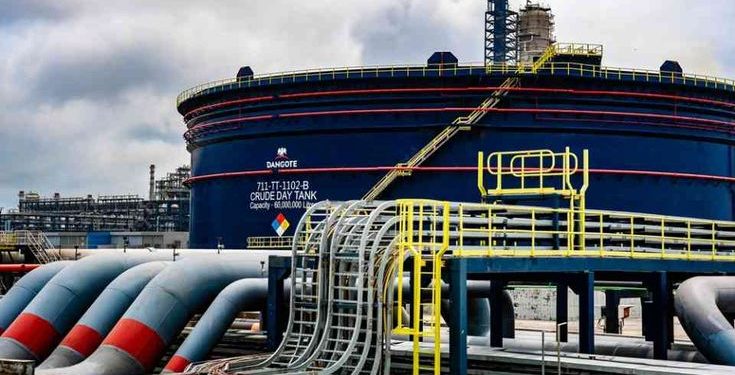The Dangote Petroleum Refinery has once again placed Nigeria in the global spotlight with its bold announcement to expand refining capacity from 650,000 barrels per day (bpd) to 1.4 million bpd. The expansion, set to be completed within three years, represents one of the most ambitious industrial undertakings in Africa’s modern history. More than a technical upgrade, it is a statement of intent, a vision to redefine Nigeria’s role from being a crude exporter to a global refining powerhouse.
At the heart of this plan lies Aliko Dangote’s conviction that Africa must own and control more of its energy value chain. The refinery, located in the Lekki Free Zone in Lagos, is already Africa’s largest single-site refining facility. Once the expansion is complete, it will surpass all global peers in single-site capacity, positioning Nigeria at the epicenter of global downstream oil operations.
Scaling Up: The Expansion Strategy
Dangote’s expansion strategy involves constructing an additional 750,000 bpd processing line adjacent to the existing plant, bringing total capacity to 1.4 million bpd. This expansion was factored into the original refinery’s design, though deferred until the first phase demonstrated full operational stability. The new phase will also increase the refinery’s output of polypropylene from approximately 900,000 tons per year to 2.4 million tons and expand the production of linear alkyl benzene and base oils.
A major objective of the project is to enhance fuel quality and export potential. The refinery plans to meet Euro VI fuel standards, produce winter-grade diesel, and improve its blending capacity to make its refined products suitable for export to Europe, the United States, and South America. The expansion marks a technological leap for Nigeria’s industrial capacity, as it will involve advanced process units, automation systems, and technology licensing agreements with leading international firms.
Financing and Ownership: A New Capital Vision
Financing such an extensive expansion requires an intricate mix of strategies. Dangote Industries Limited has announced plans to combine internal cash flow from the refinery’s early operations with external financing and a public listing on the Nigerian Exchange (NGX). The company intends to sell between 5% and 10% of the refinery’s equity to investors in 2026, potentially increasing that figure to as much as 30% in subsequent years.
Dangote has stated that the group does not intend to retain more than 65% to 70% ownership in the refinery over the long term. This shift signals a move toward shared ownership and transparency while inviting local and international investors to participate in what could become Africa’s most valuable industrial asset.
The refinery is also in discussions with strategic investors from Saudi Arabia and the broader Middle East, seeking to secure capital and technical collaboration. These partnerships are expected to strengthen the refinery’s global integration and support its expansion financing, estimated to cost several billion dollars. In addition, the Nigerian National Petroleum Company (NNPC), which already owns a 7.2% stake, may increase its equity share through new negotiations.
Workforce and National Impact
A central theme of the expansion is workforce localization. Dangote has pledged that over 85% of the personnel involved in the refinery’s next phase will be Nigerians. This commitment reflects a deliberate push toward skill development, technology transfer, and the growth of indigenous expertise in high-technology industries.
The company has launched training initiatives to prepare engineers, technicians, and operators to manage the complex refining systems. This effort is expected to create thousands of direct and indirect jobs and stimulate a vast network of small and medium-sized enterprises supporting the refinery’s supply chain.
For a country grappling with youth unemployment and foreign exchange challenges, the potential economic ripple effect is significant. Beyond job creation, the refinery’s expansion could drastically reduce Nigeria’s dependence on imported petroleum products — a financial burden that has drained national reserves for decades.
Challenges and Risks
Despite its promise, the expansion project faces considerable challenges. One persistent issue is the availability of crude feedstock. Although Nigeria is Africa’s largest oil producer, logistical and policy inefficiencies have historically hindered domestic supply to local refineries. Dangote has called for reforms in the Petroleum Industry Act to ensure a more transparent and functional crude allocation system.
Currently, the refinery sources part of its crude from international suppliers in Angola, Brazil, Equatorial Guinea, and the United States. Establishing long-term supply contracts with NNPC and private producers will be essential for the expansion to reach its full capacity.
Financial risks also loom large. With revenue largely denominated in naira but capital expenditure financed in foreign currency, exchange rate volatility could pose challenges to profitability. Cost overruns, regulatory bottlenecks, and potential delays in infrastructure development also threaten the project’s timeline. Nonetheless, Dangote remains confident that the lessons learned during the refinery’s first phase will help mitigate these risks and accelerate delivery.
Broader Economic and Geopolitical Implications
The Dangote Refinery’s expansion carries profound implications not just for Nigeria but for Africa’s entire energy landscape. If successful, it could transform Nigeria into a net exporter of refined petroleum products, potentially earning more than $55 billion annually and reversing decades of trade imbalance. The refinery will also enhance Nigeria’s energy security, stabilize fuel supply, and strengthen the naira by reducing the demand for imported fuel.
Regionally, the project positions Nigeria as a supplier of refined products to West and Central Africa, creating new trade linkages and reducing the continent’s dependency on European imports. It also underscores a broader shift toward industrial self-reliance and economic diversification within Africa.




















































